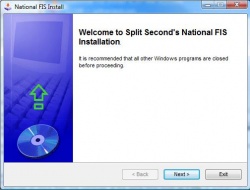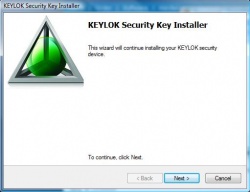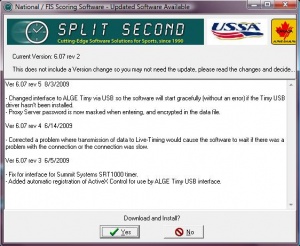National FIS Software : Installation
Installation
The latest version of the software is always available from SplitSecond.com. Simply save the installation program to your hard drive and run it. Depending on your operating system, the installation program may be run automatically or you may need to double click the downloaded file.
If your computer is unable to connect to the internet, the installation file should be saved from another computer onto a memory stick, CD, or some other media and installed from such. Split Second does not send out the software via email or regular "snail mail".
The installation program will copy all needed files to your computer and create a shortcut on the desktop.
Part of the installation process installs the driver needed for the software key. The driver installation may complete after the installation of the software has already finished.
Newer versions and revisions are always "backward compatible". This means if you have an earlier version/revision you can install a newer release without loss of setup information or data.
If this is the first time using the software, you should start the software and:
- Set up the Defaults. This sets the information that will be initially used every time a new file (race) is created.
- Create your first race. To do this, take the menu option "File/New Race". It will ask for a name for the file and once you hit "Open", the race will be created.
From this stage on the software will always open with the last race you were working on.
Notification of Updates
If your computer is connected to the internet when the software is started, the startup process will check with SplitSecond.com to see if a newer version/revision is available. If there is, you'll see a screen like this (click to enlarge):
Updates to the software happen quite frequently; especially during the winter. Unless you always want to have the latest update available, you may read through the list of changes and see nothing you need or affects you.
New "versions" are created when either a needed change has been made to the software or a significant new feature is added. When a "version" changes you typically should get the update.
New "revisions" are published with minor changes or additions.


